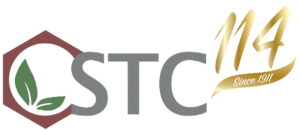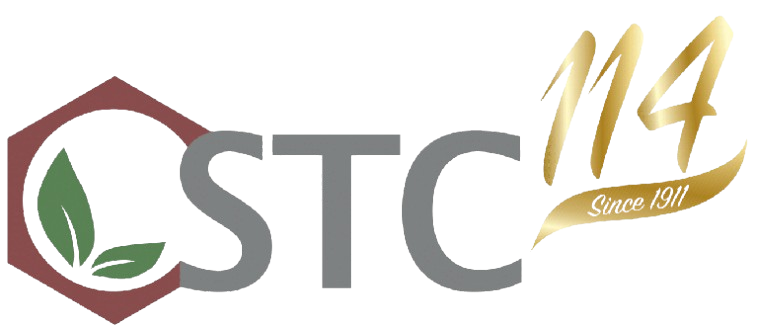
Biodynamic farming did not really take root in Latvia, but it paved the way for a new sector - organic farming. The new wave was also perceived by STC's long-standing employee O. Gabrāne, who gathered specialists around her and created a team of organic farming experts. Farmers from near and far were approached during the training. After being introduced to the basic requirements of this farming method - not to use synthetic fertilisers and chemically produced plant protection products, to preserve biodiversity in its various forms - the farms saw similarities with their existing business model. As a result, 20 farms in STC started organic certification.
At the end of 2023, STC staff visited the farms to personally thank the owners for their long-standing cooperation and their contribution to the development of organic farming. During the visit, Chief Expert V. Rāka asked the farmers to share their memories of the time when their farming started, what motivated them to become an organic farmer, as well as their current challenges and vision for the future. Almost all of them recalled how they had returned to their parents' or grandparents' properties after the restoration of property rights. For many, clearing the land, cleaning up the surroundings and building a house were all part of the process. Children were brought up and educated alongside the establishment of the farm. Everyone had a different story to tell, but what they all had in common was a love of the land, a desire to live in a clean and unpolluted environment themselves and to preserve it for future generations. When asked what motivated them to work in organic farming, for some it was a neighbour, for others it was a relative. Owner of Arumi, L. Bole warmly remembers the parish counsellor who encouraged him at the beginning and to whom he can turn even now if he needs help, adding that someone always has to be there to push, nudge, prod and encourage him.
We couldn't help noticing that farms have changed over the years. From the multi-sectoral backyard farms they were in the beginning, farms have opted for one or two sectors. As the farmers themselves admitted, there is not enough time and energy for everything, specialisation allows them to work more efficiently and use the machinery on the farm more effectively. In the discussions with farmers, the words 'specialisation' and 'cooperation' were mentioned several times when talking about the vision for the future. For example, for small livestock farms that do not grow their own grain, independent cooperation with grain growers is very important.
The re-profiling of operations is not the only change on the farm. Generational change continues in the countryside, The new owner, son Jānis Liepiņš, has taken the place of his parentswho continues the work started by his parents. Listening to the new owner, you can feel the passion and care for the future. He sees the development of his farm in cooperation and collaboration. Kalniņi has been participating in the Green Procurement for several years. According to the farmer, many people can and do grow good products, but the problem is how to sell them, so the Green Procurement ensures that the products are sold. Participation in the Green Procurement requires that the contracted range and quantity of products be guaranteed, so the farmer carefully plans crop rotations, takes into account the impact of the current year's crop on the current year's crop and many other factors that could affect yields. The knowledge that the farmer acquires through courses, seminars and exchanges is essential for all this to happen. Jānis Vaivars, who continues the work started by his grandmother Mara Vaivars, manages the farm "Ragāres". M. Vaivare was one of the pioneers who, together with like-minded people, started the green movement in the late 1990s. As her grandson admits, his grandmother set a high bar and the very name 'Ragāres' was a guarantee of high quality, which Jānis continues to uphold. The Sower's Award in 2019 is proof of this. Alongside production, the farm also has a processing area, which processes not only what is grown on the farm, but also raw materials purchased from other farms. But, Jānis Brants continues the work started by his parents. ZS "Pamati"which has expanded over the years from a multi-industry farm to one of the most modern dairy farms in the region.
Discussing the current market opportunities for organic products, Uldis Rudzītis, owner of Jaun-Ieviņasshares their conclusions. Alongside production and processing, the farm offers rural tourism. In order to develop and improve this area, the farmers have visited several European countries, where they have been surprised by the support given to local producers by the local authorities and the general public, who choose to buy products from the farm. When asked about trends in Latvia, the farmer admits that although there are specialised organic shops in towns and direct selling groups, it is difficult for a farmer to compete with supermarket offers. Rudzītis calls on shoppers to support local producers more and welcomes the creation of the first bioregion, hoping that other municipalities will follow suit.
When asked about their feelings at the moment, farmers do not hide their disappointment about the new aid payment policy. This year, many have been worried about not being able to understand how to apply for the different aid payments. While older farmers are worried about the lack of knowledge and computer skills, the opposite is true for the younger generation, who welcome the introduction of modernisation. The need for an adviser "at the fingertips" was mentioned by several farmers.

To provide you with the best experience, we use technologies such as cookies to store and/or access device information. Consenting to these technologies will allow us to process data such as browsing behaviour or unique IDs on this site. Not consenting or withdrawing consent may adversely affect certain features and functionality.